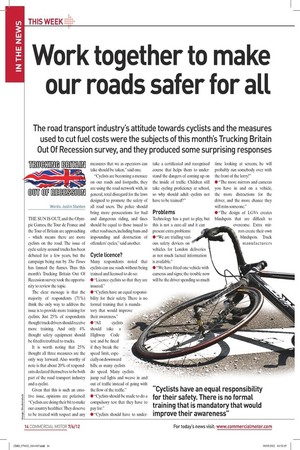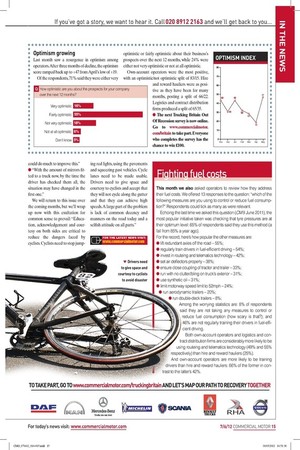Work together to make our roads safer for all
Page 9

Page 10

If you've noticed an error in this article please click here to report it so we can fix it.
The road transport industry’s attitude towards cyclists and the measures used to cut fuel costs were the subjects of this month’s Trucking Britain Out Of Recession survey, and they produced some surprising responses
THE SUN IS OUT, and the Olympic Games, the Tour de France and the Tour of Britain are approaching – which means there are more cyclists on the road. The issue of cycle safety around trucks has been debated for a few years, but the campaign being run by The Times has fanned the flames. Thus this month’s Trucking Britain Out Of Recession survey took the opportunity to review the topic.
The clear message is that the majority of respondents (71%) think the only way to address the issue is to provide more training for cyclists. Just 25% of respondents thought truck drivers should receive more training. And only 4% thought safety equipment should be fitted/retrofitted to trucks.
It is worth noting that 25% thought all three measures are the only way forward. Also worthy of note is that about 20% of respondents declared themselves to be both part of the road transport industry and a cyclist.
Given that this is such an emotive issue, opinions are polarised. “Cyclists are doing their bit to make our country healthier. They deserve to be treated with respect and any measures that we as operators can take should be taken,” said one.
“Cyclists are becoming a menace on our roads and footpaths, they are using the road network with, in general, total disregard for the laws designed to promote the safety of all road users. The police should bring more prosecutions for bad and dangerous riding, and fines should be equal to those issued to other road users, including bans and impounding and destruction of offenders’ cycles,” said another.
Cycle licence?
Many respondents noted that cyclists can use roads without being trained and licensed to do so: ● “Licence cyclists so that they are insured.” ● “Cyclists have an equal responsibility for their safety. There is no formal training that is mandatory that would improve their awareness.” ● “All cyclists should take a Highway Code test and be fined if they break the speed limit, espe cially on downward hills, as many cyclists do speed. Many cyclists jump red lights and weave in and out of traffic instead of going with the flow of the traffic.” ● “Cyclists should be made to do a compulsory test that they have to pay for.” ● “Cyclists should have to under take a certificated and recognised course that helps them to understand the dangers of coming up on the inside of traffic. Children still take cycling proficiency at school, so why should adult cyclists not have to be trained?”
Problems
Technology has a part to play, but this is not a cure-all and it can present extra problems: ● “We are trialling various safety devices on vehicles for London deliveries as not much factual information is available.” ● “We have fitted one vehicle with cameras and signs; the trouble now will be the driver spending so much time looking at screens, he will probably run somebody over with the front of the lorry!” ● “The more mirrors and cameras you have in and on a vehicle, the more distractions for the driver, and the more chance they will miss someone.” ● “The design of LGVs creates blindspots that are difficult to overcome. Extra mirrors create their own blindspots. Truck manufacturers could do much to improve this.” ● “With the amount of mirrors fitted to a truck now, by the time the driver has checked them all, the situation may have changed in the first one.” We will return to this issue over the coming months, but we’ll wrap up now with this exultation for common sense to prevail: “Education, acknowledgement and courtesy on both sides are critical to reduce the dangers faced by cyclists. Cyclists need to stop jump ing red lights, using the pavements and squeezing past vehicles. Cycle lanes need to be made usable. Drivers need to give space and courtesy to cyclists and accept that they will not cycle along the gutter and that they can achieve high speeds. A large part of the problem is lack of common decency and manners on the road today and a selfish attitude on all parts.”











































